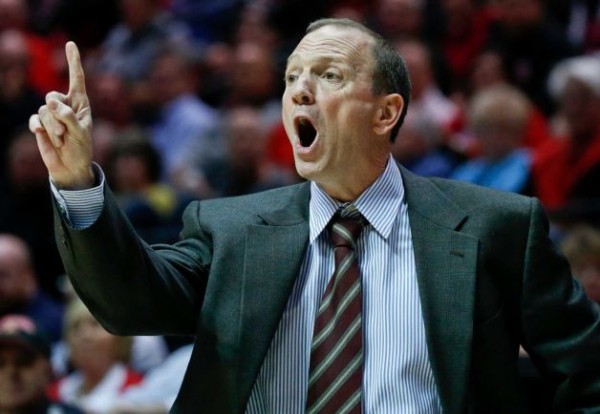Dan Monson’s ‘Buy Game’ Compensation Raises Eyebrows, But Isn’t Unique
Posted by Tommy Lemoine on December 12th, 2014Long Beach State head coach Dan Monson has assembled one of the 10 most difficult non-conference schedules in college basketball for each of the past six seasons, a tactic he’s on record as claiming helps with recruiting and toughens his players, among other benefits. The fact that The Beach also receives sizable paychecks from many of those contests – road trips to schools like North Carolina, Arizona and Ohio State – is also an understood reality, if less frequently discussed. What has not been known until this week, however, is that Monson himself reaps personal financial benefits as a result. San Diego Union Tribune’s Mark Zeigler reported on Tuesday that the eighth-year head coach in fact keeps a significant portion of the school’s payout for these ‘guarantee’ or ‘buy games’, having “been eligible to receive nearly $1 million of the $1.46 million paid to Long Beach State from 16 buy games he scheduled” since 2011-12. The notion that Monson directly profits from scheduling what often amounts to certain losses calls into question his motive for such tough scheduling – is putting his players through the gauntlet ultimately just for the money? – and sheds new light on a crafty method of compensation. But is it really unique; and, more importantly, is there a problem with it? Evidence suggests the answer to both is probably ‘no,’ even if feels a little deceitful.

Long Beach State head coach Dan Monson receives a large chunk of ‘buy’ game revenue. (Lenny Ignelzi, AP / AP)
Perhaps the only thing unique about Monson’s deal (at least to our knowledge) is the sheer dollar amount he earns from scheduling these ‘buy’ games. Using last season as an example, the report claims LBSU yielded a total of $365,000 on trips to Arizona, Washington, North Carolina State and Missouri, of which Monson was eligible for $265,000. While that’s an eye-popping figure, to be sure, the practice of sending large sums of ‘buy’ game money directly to a coach’s bank account is not exactly new. According to a USA Today article from 2007, then-Winthrop head coach Gregg Marshall made $85,869 from guarantee contests, in addition to his $118,588 base salary and other bonuses. “We don’t have available to us the big market contracts from apparel and shoe people that you can use to siphon money off to coaches,” Winthrop athletic director Tom Hickman said at the time. Likewise, NJIT head man Jim Engles – whose program received $92,000 for playing (and beating) Michigan in Ann Arbor last weekend – also takes home guarantee revenue, his contract stipulating that the school keeps the first $50,000, at which point the “coach shall be entitled to additional income received in game guarantees from Men’s Basketball thereafter, but not to exceed fifty thousand dollars ($50,000).” While these are just a few examples (and wide-ranging ones, at that), it’s clear that this method is regularly used as a self-sustaining source of remuneration – the school profits from guarantee games that the coach schedules, and is then able to directly use those profits to pay for part of the coach’s salary. It’s a win-win.
But is there anything wrong with it from a player standpoint? What about an ethical standpoint? In 2009, Delaware State head football coach Al Lavan said, “From a competitive standpoint, it’s not an ideal situation,” referring to the blowout nature of guarantee games. And that sentiment has rung true on occasion for Long Beach State, which was blown out by 34 points both at Arizona last season and at Ohio State the year before. In fact, only once since Monson took over in 2008 have the 49ers been above .500 entering the New Year. NJIT has suffered similar guarantee blowouts since it became a Division I school a few years back, the recent Michigan upset notwithstanding. Whether the long and often grueling road trips and sometimes-ugly blowouts take any psychological toll on players, we’ll probably never know, but just by looking at LBSU’s performance in conference (anecdotal, sure) it certainly does not seem to be an issue. In five of the six years the 49ers have entered conference play below .500 under Monson, they have still managed to finish among the top three in the Big West. Moreover, unlike football, where a distinct competitive mismatch could heighten the risk of injury, basketball generally does not carry such risks. The fact that Long Beach State and other mid-majors sometimes find ways to win guarantee games is even further evidence that their detrimental effects are minimal – whether their coach scheduled them for personal financial gain or otherwise.
The only objectionable aspect of the report might be the perceived disingenuousness on the part of Monson. As Zeigler points out, the coach often touts his scheduling technique’s positive effects on players and program, but has never once mentioned the large sums of money he stands to gain from it. Then again, perhaps it’s not his place, and maybe there are no ulterior motives involved. The fact is that the former Gonzaga and Minnesota head man is a proven winner that the school is lucky to have, and if you want to keep a guy like that but don’t have a high-major basketball budget, craftiness – like diverting ‘buy’ game payouts – might be your best option.









































